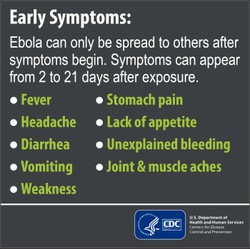Epidemics of Ebola virus disease gain global attention as the infection is a deadly one. Many people will acquire it when they care for relatives at home who are sick and there is not yet a definitive diagnosis. Even if family members know the patient has this illness, some may not understand that protective gear is necessary to avoid its transmission [1, 2].
The use of personal protective equipment for Ebola virus disease is more complex than that which will protect against less serious medical conditions. In fact, the best approach is to place the patient in a health care facility where staff are knowledgeable about the use of the gear. Protective equipment to prevent acquisition of Ebola virus disease involves gloves, impermeable gown, boots, closed shoes with overshoes, and mask and eye protection [1, 2].




 The Reality of Aspirinon 05/24/2021
The Reality of Aspirinon 05/24/2021
 An Old Microbeon 03/31/2021
An Old Microbeon 03/31/2021
 Coronavirus and Mental Illnesson 02/14/2021
Coronavirus and Mental Illnesson 02/14/2021
 Acute Ischemic Strokeon 12/25/2020
Acute Ischemic Strokeon 12/25/2020


Comments